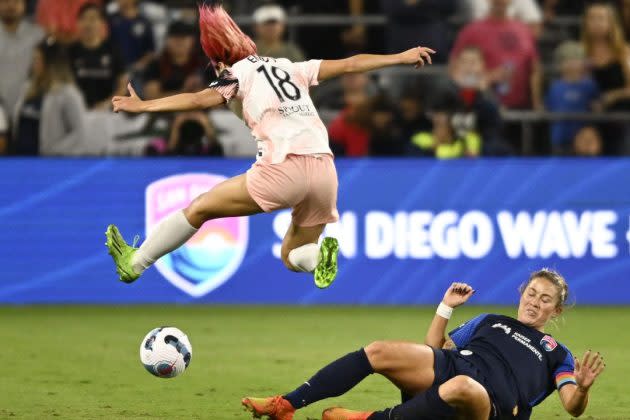NWSL Gains Private Equity Cash Amid Questions Over Lack of Rules

The NWSL is in the process of selling two expansion clubs to begin play in 2024. One is widely expected to be based in Utah, where MLS club Real Salt Lake’s new ownership group holds the rights to an expansion franchise at a bargain price. The group, led by Philadelphia 76ers and New Jersey Devils co-owner David Blitzer, also includes Utah Jazz owner Ryan Smith and Arctos Sports Partners, a private equity fund with investments across several major sports leagues—including an existing stake in the NWSL’s Portland Thorns.
Arctos acquired a 15% stake in MLS’ Portland Timbers and the Thorns last year, as first reported by Sportico. The deal marked the first stakes sold by embattled owner Merritt Paulson’s Peregrine Sports LLC, the umbrella under which both the Thorns and Timbers are owned. With equity in the combined Timbers-Thorns business, which Sportico values at $685 million, and the coming Utah expansion club, Arctos would be the first private equity firm invested in multiple NWSL clubs.
More from Sportico.com
Sporticast: NWSL Commissioner Talks Record Values, Private Equity
NWSL Puts Private Equity Safeguards on Sixth Street Team Ownership
Sporticast: Michael Jordan Airs Laundry, Snoop Dogg FaZe'd Out
Utah’s revival will give Arctos equity in two of the NWSL’s soon-to-be 14 teams, or nearly 15% of the 10-year-old league. With no current rules or restrictions around private equity ownership—including the kind of limitations other major U.S. sports leagues have imposed in recent years around stake size, scope and span—the NWSL may be confronted with the same questions many of its peers have grappled with: What role does institutional money play in the future of ownership, and how much is too much?
“The NWSL currently has investors of a variety of different types, including private equity, and is constantly evaluating our ownership guidelines to ensure the league is built for long-term success,” an NWSL spokesperson said in a statement to Sportico.
Owners across the NWSL hold a range of opinions on private equity’s place in the rapidly growing league. Some owners Sportico spoke with adamantly opposed the spread of institutional investments, while others expressed more openness to the idea. That variance could, in part, reflect the discrepancies in ownership finances within the NWSL. In general, well-capitalized owners may be less inclined to support private equity investment, since they don’t need it, while owners who entered the league earlier, at a very different price point, favor support from new sources. Those discrepancies have been exacerbated by the soaring valuations of certain clubs, resulting in divergent priorities among franchises.
Angel City co-founder and president Julie Uhrman supports PE investment. Her club is no stranger to institutional money, with controlling owner Alexis Ohanian’s current venture capital firm, Seven Seven Six, and Initialized Capital, which he was formerly a part of, among the club’s investors.
“Big picture, I think there's real value in having people with experience around the table—private equity brings that experience [and] their connections, network, access to capital,” Uhrman said. “At the end of the day, though, it's really about the structure. Are they a majority owner or minority owner? Do they have a seat on the board? … There needs to be accountability with teams. Private equity answers to so many different people, so I understand the need for limitations. I'm not sure I have an opinion on what those should be, but certainly a conversation worth having, especially in the NWSL.”
Restrictions bring some element of control. In every major U.S. sports league outside of the NFL, now including MLS, private equity investments are allowed within certain parameters. In MLS, a single fund can acquire passive minority stakes in as many as four teams (equal to about 14% of the league’s 28 teams) but cannot own more than 20% of a single franchise. Institutional investors cannot collectively hold more than 30% of one club.
The NBA shares MLS’ equity restrictions but allows firms to own minority stakes in as many as five teams (just shy of 17% of the 30-team league), as does the NHL (equal to around 15% of its teams). MLB bylaws also allow investment funds to hold minority stakes, but lack the limit on a number of teams a fund can invest in.
There’s also the question of allowing institutional investment in the league itself. Referencing a WNBA-style raise, Uhrman floated the idea of institutional partners committing capital to the league as well. The WNBA, which essentially divided its equity evenly between the league and its teams in its $75 million raise, is in a very different position than the single-entity NWSL.
“Funding the league and funding league initiatives that would grow the fan base, grow tools and services to support the individual teams develop additional revenue streams, it's critically important, and that money needs to come from somewhere,” Uhrman said.
This story has been updated to include comment from the NWSL.
Best of Sportico.com

